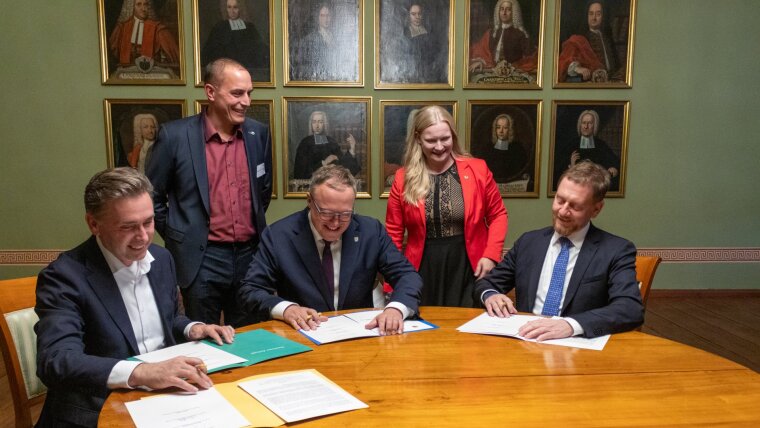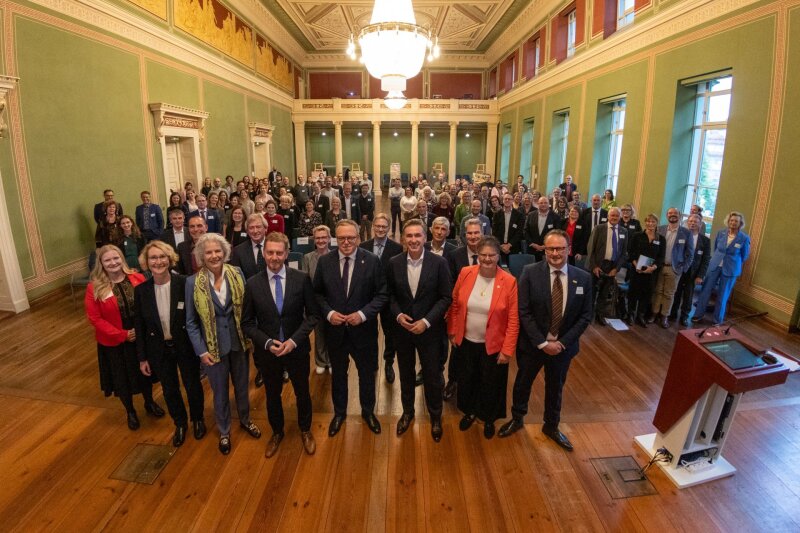
- Life
- Research
- Event
Published: | By: Kati Kietzmann
The German Centre for Integrative Biodiversity Research (iDiv) celebrated the start of a new chapter in its history with a ceremony today: 13 years of funding from the Deutsche Forschungsgemeinschaft (DFG, German Research Foundation) will come to an end in December, with Saxony-Anhalt, Thuringia, and Saxony taking over the majority of the basic funding. In a joint statement, the minister presidents of the three Central German states committed to funding iDiv beyond 2030. They also called for greater involvement from the federal government, which has so far contributed to basic funding through the Helmholtz Centre for Environmental Research (UFZ).
More than 150 guests from politics, science, and society attended the ceremony in the Löwengebäude of the Martin Luther University Halle-Wittenberg. Saxony-Anhalt’s State Secretary for Science, Thomas Wünsch, and the minister presidents of Thuringia and Saxony, Mario Voigt and Michael Kretschmer, recapitulated the successes of iDiv’s 13-year history in their speeches. In particular, they praised iDiv’s role in establishing integrative biodiversity research as a pioneering field of research at the universities of Halle, Jena, and Leipzig, as well as at the Helmholtz Centre for Environmental Research. In a video message, Federal Environment Minister Carsten Schneider emphasized the research centre’s contributions to safeguarding biological diversity. The DFG considers the multi-million euro funding a success: the research centre now enjoys international recognition and visibility.
Participants at the iDiv ceremony in the main building of the University of Halle.
Image: Stefan Bernhardt (iDiv)Statements
We still don’t know everything about the complex, often fascinating interplay in nature. That is why we need iDiv. Established collaborations, for example with the Federal Agency for Nature Conservation and the Federal Environment Agency, should definitely be continued. The better we understand biodiversity, the more effectively we can protect it and the better we can secure our basis for a good life.
Carsten Schneider, Federal Minister for the Environment, Nature Conservation and Nuclear Safety
The research carried out by the Biodiversity Centre is important and helps to protect biodiversity now and in the future. As one of the three main locations, Leipzig makes a decisive contribution to this. Together with Leipzig University, the Free State of Saxony continuously supports and promotes the centre and its valuable scientific work. In addition, the Free State has invested in the construction of laboratories, among other things, in order to advance biodiversity research.
Michael Kretschmer, Minister President of the Free State of Saxony
Biodiversity is the most visible sign of a healthy environment—a gift for us all. However, the fact that Central Germany is now a location for globally recognized biodiversity research was no coincidence, but the result of hard work and reliable funding. This money is well invested. Because only with strong research can we find the right answers to the challenges of our time. And that is why we, the three Central German states, share responsibility for the iDiv.
Dr Mario Voigt, Minister President of the Free State of Thuringia
iDiv stands for excellent future research in Central Germany. It is therefore all the more important that this beacon continues to radiate far into the future following its successful establishment and start-up. The long-term funding secured by the Central German states, universities and UFZ creates a good basis for this as well as planning security for bright minds and their pioneering research on the hot topic of biodiversity. This heralds the start of the next era at iDiv.
Thomas Wünsch, State Secretary in the Ministry of Science, Energy, Climate Protection and the Environment of Saxony-Anhalt
The iDiv not only conducts excellent research, but also acts as a catalyst for the further scientific development of Martin Luther University: since the centre was founded, the University of Halle has established itself as an internationally renowned centre for biodiversity research. The many scientific publications by our researchers in renowned journals as well as high-ranking funding, including two of the coveted research awards from the European Research Council (ERC), bear witness to this.
Prof. Dr Claudia Becker, Rector of Martin Luther University Halle-Wittenberg
Over the past 13 years, iDiv has impressively developed into an internationally respected and recognized centre for integrative biodiversity research. Together with the universities in Halle and Jena, the Helmholtz-Centre for Environmental Research (UFZ) and the federal states of Saxony, Saxony-Anhalt and Thuringia, Leipzig University is ensuring the future viability of iDiv. Stopping the loss of biodiversity is a major task. The researchers at iDiv are making a significant contribution to the fulfilment of this task and I am convinced that they will continue to gain important insights into the future of biodiversity in the coming decades and publish their findings in high-ranking scientific journals.
Prof Dr Eva Inés Obergfell, Chair of the iDiv Board of Trustees and Rector of Leipzig University
iDiv is a success story—scientifically, institutionally and socially. For over a decade, the centre has been researching how we can tackle the global loss of biodiversity—one of the most pressing challenges of our time—with significant participation from Friedrich Schiller University Jena. This is not just about species, but about the foundations of all life on earth. The fact that iDiv has succeeded in combining internationally visible cutting-edge research with concrete added value for society is impressive proof of the effectiveness of interdisciplinary, cross-location research in Central Germany.
Prof. Dr Andreas Marx, President of Friedrich Schiller University Jena
The UFZ is one of the most important partners of the iDiv. It has contributed significantly to its success in all phases—from the idea to its foundation to the present day—in terms of content, personnel and funding, and will continue to do so. For example, the UFZ contributes three of the nine professorships and provides iDiv scientists with important research infrastructure, such as the UFZ experimental station in Bad Lauchstädt.
Prof. Dr Kathrin Böhning-Gaese, Scientific Director of the Helmholtz Centre for Environmental Research (UFZ)
The iDiv stands for 13 years of cutting-edge research and active commitment to biodiversity, the conservation of which is one of the most pressing tasks of our time. The DFG has funded the centre over the maximum term of three funding periods and with around 135 million euros as a pioneering institution that transcends university and national borders. Its outstanding work shows that such strategic investments more than pay off—directly for research and progress, but also for policy advice and social transfer as well as for the international appeal and performance of the German science and business location. The fact that this work does not end today, but that the participating federal states and locations continue to work hand in hand to continue and expand the iDiv, is important and we are extremely pleased.
Prof. Dr Johannes Grave, Vice-President of the German Research Foundation (DFG)
As an economist, I learn new things about the fascinating diversity of nature from my colleagues every day. Through interdisciplinary cooperation, we can quantify how valuable nature is for people, even if these values do not—yet—appear in the business section of the newspaper. On this basis, we develop ways of reconciling sustainable use of nature with personal responsibility and economic interests. Establishing such integrative biodiversity research here in Central Germany with international visibility was only possible because funding from the German Research Foundation gave us the freedom to do so. We would like to thank the three state governments for placing the same trust in our research. We are convinced that cutting-edge research is the requirement for finding new ways to protect and sustainably utilize nature.
Martin Quaas, Scientific Managing Director iDiv e.V.
iDiv has grown from an idea of a few to a conviction of many and is impressively supported and funded by the federal states of Central Germany with their respective largest universities as well as the federal government via the Helmholtz Centre for Environmental Research (UFZ). Integrative biodiversity research is lived in the iDiv cooperation network and will in future be further strengthened by a letter of intent from the three states to shape the scientific landscape over the coming decades, as well as the social and political understanding of the biodiversity issues of our time. iDiv shows what synergies in a network of cooperation can achieve—and we are only at the beginning.
Anne Wesemann, Administrative Managing Director iDiv e.V.
Background
The transformation of ecosystems and biotic communities and the global loss of species are among the greatest challenges of our time. Since 2012, iDiv scientists have been researching these changes and developing the basis for evidence-based policy and practice. The research centre integrates a wide range of research fields: from the interactions between animals, plants and microbes to trends in global biodiversity change. For example, iDiv researchers recently found that global biodiversity has declined by around 2 to 11% in the 20th century due to land use change alone—by the middle of this century, climate change could become the main reason for the decline in biodiversity.
iDiv has developed into a globally visible beacon of biodiversity science. Today, 290 employees from more than 40 nations work for the research centre. In addition, more than 150 member groups conduct research at various locations in Halle, Jena and Leipzig. Founded in 2024, iDiv e. V. ensures the long-term sustainability of the research centre as an institution of its founding members: Friedrich Schiller University Jena, Martin Luther University Halle-Wittenberg, Helmholtz-Centre for Environmental Research (UFZ) and Leipzig University. The three federal states of Saxony, Saxony-Anhalt and Thuringia, together with other partners, provide the basic funding for the research centre.
